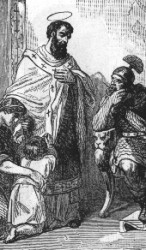 St. Paulinus
Name: St. Paulinus
Date: 22 June
Paulinus was of a family which boasted a long line of senators, prefects and consuls of Rome, and he was educated with great care. His genius and eloquence in oratory, prose and verse were theadmiration of all the brilliant Christian minds of his time, including Saint Gregory the Great, SaintAmbrose, Saint Jerome, Saint Augustine, and Saint Martin of Tours. It is believed that SaintAmbrose would have chosen him to replace him as bishop of Milan, but Saint Paulinus was farfrom Milan when Saint Ambrose died. He said of him that Christians should follow and imitateSaint Paulinus, and that the greatest good fortune of the century in which they were living was tobe witness to the life of so rare and admirable a man. Saint Paulinus, at first Roman Consul and then Prefect or Governor of Rome, had more thandoubled his wealth by his marriage with a virtuous Spanish noblewoman; he was one of thewealthiest and most honored men of his time, possessing domains in several nations of Europe. Though he was the chosen friend of Saints, he was still only a catechumen, and trying to servetwo masters. But God drew him to Himself along the way of sorrows and trials. The first andonly child of Paulinus and Theresia died shortly after birth. Saint Paulinus received baptism soonafterwards, at the age of thirty-eight, from the bishop of Bordeaux, Saint Delphin; then hewithdrew into Spain to be at liberty to pray in solitude. He was ordained a priest in Barcelona, and afterwards retired to Nola in Campania. And then, in consort with his holy wife, he liberated all his slaves, sold all his vast estates in various parts of theempire, distributing their proceeds so widely and generously that Saint Jerome says both East andWest were filled with his alms. In Nola he built the magnificent Church of Saint Felix and servedit night and day, living a life of extreme abstinence and toil. He and his wife agreed to live asbrother and sister; they exchanged their silver utensils for those of wood and pottery, and worerobes of rude cloth, practicing from that time on a genuine poverty. Certain highly-placed worldlypersons were very much offended by this abrupt change in the way of life of these persons of suchgreat dignity. Nonetheless, in 409 Saint Paulinus was chosen Bishop of Nola, and for more than thirty years so ruled as to be conspicuous, in an age blessed with many great and wise bishops. Saint Gregorythe Great tells us that when the Vandals of Africa made a descent on Campania, Paulinus spent allhe had in relieving the distress of his people and redeeming them from slavery. Finally, when allhad been disposed of, there came to him a poor widow, whose only son had been taken away bythe son-in-law of the Vandal king. “What I have I give you, said the Saint to her; “we will go toAfrica and you will offer me to the prince, saying I am one of your slaves, in exchange for theprisoner.” Her resistance once overcome, they went, and Paulinus was accepted in place of thewidow’s son and employed as gardener. After a time the king discovered, by divine interposition,that this valuable slave of his son-in-law was the renowned Bishop of Nola. He at once set himfree, granting him also the freedom of all the townsmen of Nola who were in slavery. One who knew Saint Paulinus well says he was “meek as Moses, as priestly as Aaron, innocent as Samuel, tender as David, wise as Solomon, apostolic as Peter, loving as John, cautious asThomas, brilliant as Stephen, fervent as Apollos.” Saint Paulinus died in 431. His holy remainswere transferred several times but restored to the cathedral of Nola in 1908. |